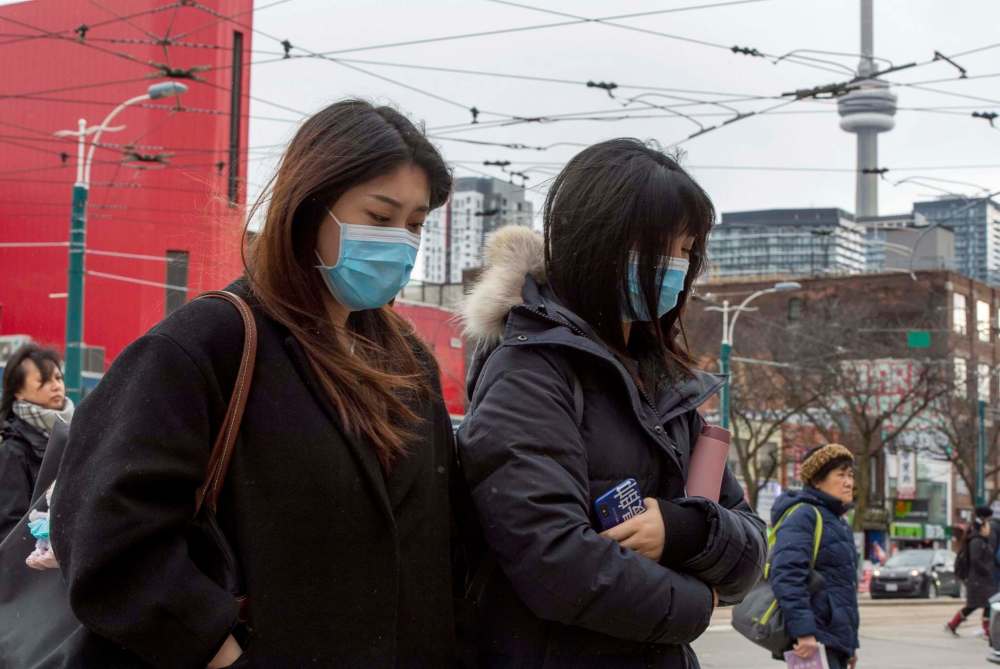Lessons from SARS are being ignored
Advertisement
Read this article for free:
or
Already have an account? Log in here »
To continue reading, please subscribe:
Monthly Digital Subscription
$0 for the first 4 weeks*
- Enjoy unlimited reading on winnipegfreepress.com
- Read the E-Edition, our digital replica newspaper
- Access News Break, our award-winning app
- Play interactive puzzles
*No charge for 4 weeks then price increases to the regular rate of $19.00 plus GST every four weeks. Offer available to new and qualified returning subscribers only. Cancel any time.
Monthly Digital Subscription
$4.75/week*
- Enjoy unlimited reading on winnipegfreepress.com
- Read the E-Edition, our digital replica newspaper
- Access News Break, our award-winning app
- Play interactive puzzles
*Billed as $19 plus GST every four weeks. Cancel any time.
To continue reading, please subscribe:
Add Free Press access to your Brandon Sun subscription for only an additional
$1 for the first 4 weeks*
*Your next subscription payment will increase by $1.00 and you will be charged $16.99 plus GST for four weeks. After four weeks, your payment will increase to $23.99 plus GST every four weeks.
Read unlimited articles for free today:
or
Already have an account? Log in here »
Hey there, time traveller!
This article was published 04/03/2020 (2108 days ago), so information in it may no longer be current.
Outside Asia, Canada was the country hardest hit by the SARS coronavirus. By the end of the 2003 global epidemic, there were 438 cases of SARS in Canada, resulting in 44 deaths. Most cases were concentrated in Toronto, as were all fatalities. More than 100 health-care workers became ill and three died, including two nurses.
Ontario’s independent commission to investigate the introduction and spread of SARS identified a key lesson: in the absence of scientific certainty about how an infectious illness is transmitted, reasonable precautions must be taken.
Justice Archie Campbell, who served as the commission’s chair, explained that this precautionary principle places the emphasis on safety, rather than science. In other words, if we don’t know exactly how a virus spreads, we shouldn’t wait for the science to be settled to protect health-care workers.

Despite this important lesson from the SARS epidemic, the Canadian government now seems content to wait for conclusive evidence on how the 2019 novel coronavirus (COVID-19) is transmitted before taking the necessary steps to protect frontline health-care workers.
As provinces brace for a potential outbreak of COVID-19, nurses’ unions are speaking out about the threat to health-care workers. Notably, the Public Health Agency of Canada is failing to properly prepare frontline workers in acute-care settings and overlooking the clear lessons learned from our previous experience with pandemics.
The federal agency was created in the wake of the SARS epidemic to provide national leadership and clarity during public-health crises. However, it has never embraced this mandate. During the 2003 pandemic, frontline workers received conflicting messages and were often confused about how best to protect themselves and their patients.
History may repeat itself if the Public Health Agency of Canada continues to provide weak leadership. In particular, it’s disappointing that the agency has failed to advise acute-care facilities to adopt the precautionary principle — the key lesson from SARS.
Meanwhile, national public-health agencies in the United States, the European Union and the United Kingdom have called for contact, droplet and airborne precautions to protect health-care workers, deeming the illness of one health-care worker to be one too many.
In response to COVID-19, these agencies are recommending an N-95 respirator, which is custom-fitted to a health-care worker’s face to prevent any leakage. The province of Ontario, which experienced the worst of SARS, is also choosing to mandate the N-95 respirator for health-care workers, in light of the current scientific uncertainty about how the virus is transmitted.
In contrast, the Public Health Agency of Canada is recommending surgical masks for health-care workers — a device designed to protect the patient from the wearer’s respiratory issues, not the reverse.
Canada can and should do better. The agency’s position is quite simply an abdication of leadership. Unprotected, health-care workers can easily transmit viruses throughout acute-care facilities. Recent evidence published in The Lancet, a peer-reviewed medical journal, recommends “aggressive” protection for health-care workers caring for presumed and confirmed cases of COVID-19. The study noted that even a non-symptomatic person can spread COVID-19 “with high efficiency”; face masks and other conventional forms of protection, according to the article, “provide insufficient protection.”
As nurses, we know that patient safety starts with worker safety. If our health-care workers are safe, then our patients are safe.
The Canadian Federation of Nurses Unions has asked the Public Health Agency of Canada and Canada’s health minister to act out of an abundance of caution and carefully consider the lessons learned from the SARS epidemic. Canada should follow the precautions being taken in the United States, the European Union and the United Kingdom, as well in the province of Ontario.
We can and should do our best to protect our health-care workers, and by extension, our vulnerable patient populations.
Linda Silas is a nurse and president of the Canadian Federation of Nurses Unions, representing nearly 200,000 nurses and student nurses across the country.







